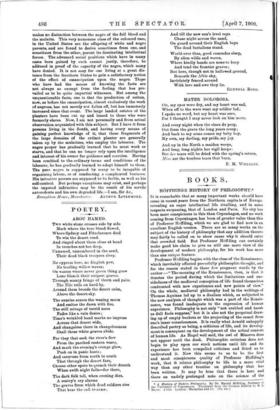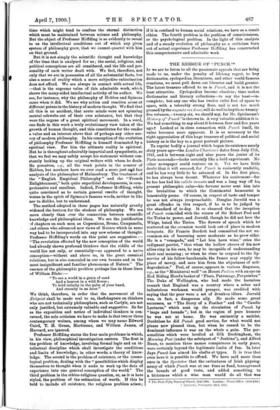BOOKS.
HoFFDING'S HISTORY OF PHILOSOPHY.* IT is remarkable that so many important works should have come in recent years from the Northern capitals of Europe, revealing an eager intellectual life rivalling, and in some respects surpassing, that of London and Paris. No city has been more conspicuous in this than Copenhagen, and no work coming from Copenhagen has been of greater value than this of Professor H5ffding, which we are glad to find now in an excellent English version. There are so many works on the subject of the history of philosophy that any addition thereto may fairly be called on to show cause why it should enter that crowded field. But Professor Hoffding can certainly make good his claim to give us still one more view of the development of modern philosophy, for his work has more than one unique feature.
Professor HOffding begins with the close of the Renaissance, which inevitably affected powerfully philosophic thought, and for the reason stated in these few pregnant words by the author :—" The meaning of the Renaissance, then, is that it denotes the period during which the limitations and one- sidedness of the medimval conception of life found themselves confronted with new experiences and new points of view." On the whole, medimval philosophy had in the writings of Thomas Aquinas led up to a dualism which, as subjected to the new analysis of thought which was a part of the Renais- sance, was found inadequate to the expression of human experience. Philosophy is not only "not crabbed and harsh as dull fools suppose," but it is also not the perpetual draw- ing up of empty buckets or the projecting of the camel from one's inner consciousness. It is really what Arnold unhappily described poetry as being, a criticism of life, and its develop. ment is consequent on the development of the actual content of human life. As Hegel well said, the owl of Minerva does not appear until the dusk. Philosophic criticism does not begin to play upon our stock notions until life and its experience has both compelled criticism and fitted us to understand it. Now this seems to us to be the first and most conspicuous quality of Professor Hoffding's work, that it relates philosophy to life in a more vital way than any other treatise on philosophy that has been written. It may be true that there is here and there an unduly prolonged note on the science of the
• A History of Modern Philosophy. By Dr. Harald Honing, Professor at the University of Copenhagen. Translated from the German Edition by B. L. Meyer. 2 vols. London: Macmillan and Co. [20s. net.]
time which might tend to confuse the eternal distinction which must be maintained between science and philosophy. But the object of Professor Hiiffding is so evidently to reveal to us the intellectual conditions out of which any given system of philosophy grew, that we cannot quarrel with him on that ground.
But it is not simply the scientific thought and knowledge of the time that is analysed for us ; the social, religious, and
political conceptions are all considered, and the life and per- sonality of each writer dealt with. We feel, therefore, not only that we are in possession of all the substantial facts, but also a sense of reality which a mere subjective ratiocination
does not afford. We are always in contact with actual life, —that is the supreme value of this admirable work, which
shows the many-sided intellectual activity of its author. We see, for instance, why the philosophy of Hobbes and Spinoza
came when it did. We see why action and reaction arose at different points in the history of modern thought. We find that all this is no accident, that acute minds were not spinning mental cobwebs out of their own substance, but that they were the organs of a great spiritual movement. In a word, one finds in this work a truly evolutionary view taken of the growth of human thought, and this constitutes for the reader a value and an interest above that of perhaps any other sur- vey of modern philosophy. In his conception of the evolution of philosophy Professor Hoffding is himself dominated by a spiritual view. For him the ultimate reality is spiritual. But he is throughout admirably impartial and sympathetic, so that we feel we may safely accept his statement without con-
stantly looking up the original writers with whom he deals. He perceives, e.g., all the weak points in the armour of Hobbes, but nowhere have we ever read a more just aid fair analysis of the philosopher of Malmesbury. The treatment of the " English Empirical Philosophy " and the " French Enlightenment," both quite superficial developments, is com- prehensive and excellent. Indeed, Professor Hoffding, while
quite convinced as to certain general results of thought, writes in the spirit of Spinoza's famous words, neither to like nor to dislike, but to understand.
The method adopted in these pages has naturally greatly widened the horizon for the student of philosophy. We see more clearly than ever the connection between scientific knowledge and philosophical ideas. We see the justification of chapters on such men as Copernicus, Bruno, Campanella, and others who advanced new views of Nature which in some way had to be incorporated into any new scheme of thought. Professor Hoffding's words on this point are suggestive :— " The revolution effected by the new conception of the world had already shown profound thinkers that the riddle of the world lies not only, or essentially—as appeared to a naive conception—without and above us, in the great cosmical relations, but is also concealed in our own breasts and in the most insignificant and familiar phenomena of Nature." The essence of the philosophic problem perhaps lies in those lines of William Blake :- " To see a world in a grain of sand And a heaven in a wild flower ; To hold infinity in the palm of your hand, And eternity in an hour."
We think, therefore, in order that the movement of the
Zeitgeist shall be made real to us, thedchapters on thinkers who are not technically philosophers, such as Carlyle, are not
only justified, but extremely valuable and suggestive. So far as the exposition and notice of individual thinkers is con- cerned, the sole criticism we have to make is that two or three contemporary writers, among whom we may name Edward Caird, T. H. Green, Martineau, and William James, of Harvard, are ignored.
Professor Hoffding states the four main problems in which, in his view, philosophical investigation centres. The first is the problem of knowledge, involving formal logic and an in- tellectual discipline which shall investigate the conditions and limits of knowledge ; in other words, a theory of know- ledge. The second is the problem of existence, or the cosmo- logical problem, dealing with the " possibilities which display themselves to thought when it seeks to work up the data of experience into one general conception of the world." The third problem is the ethico-religious question, or, as it is here styled, the problem of the estimation of worth. If this be held to include all existence, the religious problem arises; if it is confined to human social relations, we have as a result ethics. The fourth problem is the problem of consciousness, or the psychological problem. In the light of this analysis and of a steady evolution of philosophy as a criticism born out of actual experience Professor Thiffding has constructed this comprehensive and admirable work.







































 Previous page
Previous page